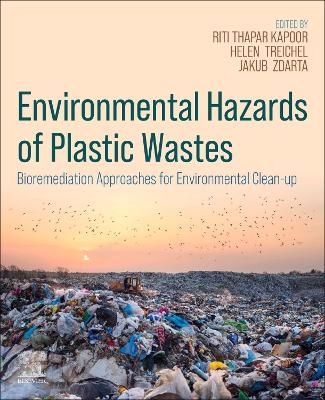
Environmental Hazards of Plastic Wastes
Elsevier - Health Sciences Division (Verlag)
978-0-443-23599-3 (ISBN)
- Noch nicht erschienen (ca. Februar 2025)
- Versandkostenfrei
- Auch auf Rechnung
- Artikel merken
Associate Professor Jakub Zdarta graduated from the Faculty of Chemistry of the A. Mickiewicz University in Poznań in 2010 and the Faculty of Chemical Technology at the Poznań University of Technology in 2013. In 2017, he obtained the degree of Doctor of Chemical Sciences in the field of chemical technology, and in 2021 he become an associate professor. In 2017-2018 and in 2021, he completed internships at the Technical University of Denmark, and in 2019 at the University of Technology Sydney. Since 2018, he has been employed at the Institute of Chemical Technology and Engineering at the Faculty of Chemical Technology of the Poznań University of Technology. His research area focuses on biotechnology, biocatalysis, enzyme immobilization, biological wastewater treatment, bioremediation, organic pollutant removal, membrane processes, membrane bioreactors, biomass pretreatment and conversion, as well as hybrid materials and biomaterials. Dr. Riti Thapar Kapoor is Associate Professor in Amity Institute of Biotechnology, Amity University Uttar Pradesh, Noida, India. Dr. Kapoor received her Ph.D from University of Allahabad and worked as post - doctoral fellow at Banaras Hindu University, Varanasi, India. Dr. Kapoor has fourteen years of teaching and research experience and her area of specialization is environmental biotechnology, bioremediation, wastewater treatment and abiotic stresses. Dr. Kapoor has published 11 books and over 105 research papers in various journals of national and international repute. Dr. Kapoor has visited 8 countries for participation in different academic programmes. Dr. Kapoor has received prestigious travel award from Bill & Melinda Gates Research Foundation under CGIAR project for participation in International training programme held at International Rice Research Institute (IRRI), Manila, Philippines in 2010. She is also recipient of DST travel grant for participation in International Conference held at Sri Lanka in 2013. Dr. Kapoor has been awarded with Teacher’s Research Fellowship from Indian Academy of Sciences, Bengaluru in 2019. She has supervised and mentored a number of research projects sanctioned by different government funding agencies such as DAE, DST and UPCST etc. She has successfully supervised three research students for Ph.D. degree besides several (more than 80) masters and graduate students for their dissertation thesis. Prof. Helen Treichel is a Research Productivity Scholar at level 1C in Environmental Sciences. She holds a degree in Food Engineering from the Federal University of Rio Grande (1999), a Master's and a Ph.D. in Food Engineering from the State University of Campinas (2001 and 2004, respectively). She is currently a Professor and Researcher at the Federal University of Fronteira Sul (UFFS)-Campus Erechim. She works in undergraduate courses in Environmental and Sanitary Engineering, Biological Sciences, and Agronomy and is a Permanent Professor in the Graduate Programs in Environmental Science and Technology (UFFS-Campus Erechim), Food Science and Technology (UFFS-Campus Laranjeiras do Sul) and Biotechnology and Biosciences (UFSC). She coordinates the Laboratory of Microbiology and Bioprocesses (LAMIBI) at UFFS (Erechim), working mainly on the following topics, design of experiments and statistical optimization of processes; production, purification, immobilization, and application of enzymes; use of microorganisms and enzymes in the treatment and/or recovery of effluents and residues; bioherbicides; biofuels. She acts as the leader of the Agroenergy research group.
1. Plastic in the environment, properties, types, and application 2. Hazardous effects of plastic waste on the ecosystem, human-beings, and animal health. 3. Microplastics in marine ecosystem and Current trends in environmental pollution and mechanisms of toxicological profile. 4. Biodegradation of plastics: current scenario and prospects for environmental safety 5. Accumulation of plastic waste in the natural environment. and its life cycle assessment 6. Relevance of microbes in plastic waste degradation 7. Fungal degradation of plastics 8. Bacterial degradation of plastics 9. Synergistic approaches for the bioremediation of plastic pollutants 10. Role of earthworms in the degradation of microplastics 11. Mechanism of plastic biodegradation 12. Role of microbial enzymes in the degradation of plastics 13. Use of waste plastic in preparation of value-added construction materials. 14. Bioplastics for circular economy 15. Current achievements in removal of plastic wastes, new technologies involved and economics 16. Application of plastics for production of fuel 17. Recent development in the use of enzymes for degradation of microplastics 18. Economic approaches for plastic waste removal/disposal and reuse. 19.Mechanism and pathways for recycling of plastic wastes and application possibilities. 20. Practical strategy to reduce supermarket plastic bags with technical and economic data and to check its global impact on pollution reduction 21. Case studies from Asia, Europe, and America for plastic waste removal/recycling 22. Monitoring tools and technologies for plastics in the natural environment (soil, sediment, water) 23. Regulations, policies and acts related for the management of plastic wastes in different countries
| Erscheint lt. Verlag | 3.2.2025 |
|---|---|
| Verlagsort | Philadelphia |
| Sprache | englisch |
| Maße | 191 x 235 mm |
| Gewicht | 450 g |
| Themenwelt | Naturwissenschaften ► Biologie ► Mikrobiologie / Immunologie |
| Naturwissenschaften ► Biologie ► Ökologie / Naturschutz | |
| Technik ► Umwelttechnik / Biotechnologie | |
| ISBN-10 | 0-443-23599-6 / 0443235996 |
| ISBN-13 | 978-0-443-23599-3 / 9780443235993 |
| Zustand | Neuware |
| Informationen gemäß Produktsicherheitsverordnung (GPSR) | |
| Haben Sie eine Frage zum Produkt? |
aus dem Bereich


